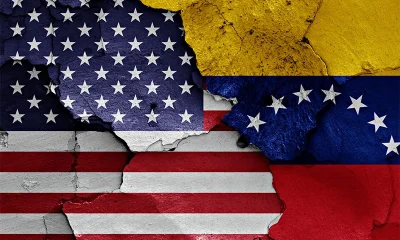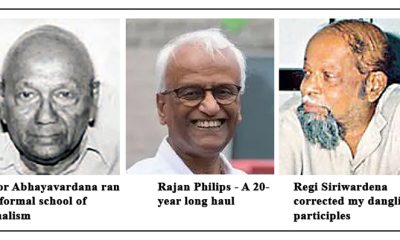Editorial
Bullets beat virus to it

Tuesday 1st December 2020
The Mahara Prison riot has left eight inmates dead and more than 70 others injured. Some of them are in a very serious condition, we are told. Trouble started when about 183 inmates tested positive for COVID-19 and had to be taken to treatment centres, on Sunday. Others also wanted to be removed from the virus-ridden jail, and turned aggressive when their demand was not met. The STF was called in to restore order and prevent a mass breakout.
The knee-jerk reaction of the government was to blame the prison riot on an invisible hand. State Minister of Prison Reforms and Prisoners’ Rehabilitation, Sudarshini Fernandopulle, speaking in Parliament, yesterday, said a hidden hand had engineered Sunday’s clashes. Minister Wimal Weerawansa said a drug dealer, transferred to the Mahara Prison from Welikada, had distributed narcotics among inmates and instigated violence. Politicians are known to ‘see more devils than vast hell can hold’.
The incumbent government is dogged by a bad reputation anent prisons owing to the 2012 Welikade Prison riot, where 27 persons were killed under a previous Rajapaksa government. Now, the current administration has another huge problem to contend with on the human rights front. Sunday’s incidents are bound be taken up in Geneva, come the next UNHRC session.
However, there’s no gainsaying that some underworld elements are bent on inciting violence in prisons. Their sinister plans must be defeated to make the correctional facilities safe, but a perquisite for doing so is to deny the troublemakers among prisoners opportunities to instigate others to riot. The current surge in COVID-19 infections is fraught with the danger of causing panic in other prisons as well. A tense situation is said to be prevailing in the old Bogambara Prison, where prisoners are brought to undergo quarantine. Protests have been reported from there, and several inmates have already made abortive escape bids. Prisoners were protesting at the Negombo jail at the time of going to press.
Sunday’s prison riot could have been averted if precautions had been taken to prevent the spread of panic among prisoners and remandees. The Mahara Prison, packed to the rafters, with so many COVID-19 infections, was disaster waiting to happen. During the first wave of infections, which the government succeeded in tackling effectively, we argued in this space that prisoners were more vulnerable than others, given the appalling conditions of the Sri Lankan jails. We pointed out that even in the US with much better prisons than Sri Lanka’s there was a high incidence of COVID-19 among the prison population, and prisoners were protesting.
Everybody knew our prisons were ticking time bombs, but, unfortunately, nobody did anything about it. The number of infections among prisoners has crossed 1,100. Prisoners’ concerns about their safety should be appreciated, and urgent action taken to ensure that they are not exposed to the virus.
The Mahara Prison inmates, however, were not blameless; they resorted to violence, carried out arson attacks and attempted a mass breakout. The trail of destruction they have left behind alone is incriminating evidence against them. They cannot claim their fear of COVID-19 in extenuation of what they have done. But it is not yet known whether the force the Prison guards and the police used was proportional to the threat they faced, or whether there were excesses on their part. The government has appointed a committee to investigate Sunday’s riot. The Opposition has demanded that the incidents be probed by a group of independent investigators; one cannot but agree with it.
It is incumbent upon the government to ensure that the Mahara Prison clashes will be thoroughly investigated, the findings of the probe committee made public and justice served while aggressive testing is conducted in all prisons and infected inmates are removed for treatment forthwith. That is the only way to defuse tension in prisons and avert another disaster.
Editorial
When docs down stethoscopes

Saturday 24th Junuary, 2026
Doctors launched a 48-hour token strike yesterday in protest against what they have described as the government’s failure to implement a six-point agreement reached between the Government Medical Officers’ Association (GMOA) and the Ministry of Health. They are demanding that their allowances be increased and a separate service minute be introduced for the state sector doctors, among other things. The government has claimed that the doctors’ demands are unreasonable, and the strike did not cripple the state health institutions. It is sounding just like its predecessors.
The government is either misinformed or believing in its own propaganda lies. Doctors’ strikes always have a crippling impact on the state-run hospitals and cause unbearable suffering to patients who are dependent on free healthcare. The government should stop making false claims, and face reality.
Ideally, doctors should not strike at the expense of the sick, but there arise situations where they are compelled to flex their trade unions muscles to jolt governments into heeding their grievances. The incumbent government led by the JVP, which used strikes as part of its strategy to capture state power, has failed to be different from the previous administrations which mismanaged labour issues and provoked workers into trade union action, causing much inconvenience to the public. State workers and their trade unions backed the JVP-led NPP to the hilt, enabling its meteoric rise to power, and after winning the 2024 general election, the NPP declared that there would be no need for strikes thereafter because the new government would resolve all trade union disputes amicably without leaving any room for work stoppages. That pledge has gone unfulfilled.
Opinion may be divided on the striking doctors’ demands, but if the government has agreed to grant them, it must fulfil its pledge or have another round of negotiations and arrive at a compromise formula. It will be a mistake for the government to play a game of chicken with the GMOA or try to intimidate doctors with the help of its propaganda hitmen and front activists who stage protests against strikers, posing as patients and concerned citizens and calling for action to crush trade union struggles. Such tactics are counterproductive.
The warring doctors must also be flexible. Although the government, in its wisdom, has boasted that the state coffers are overflowing and it is free from pecuniary woes due to its proper economic management and its successful battle against corruption, the economic situation is not that rosy. Recent natural disasters have taken a heavy toll on the economy, and rebuilding and relief programmes will cost a great deal of state funds. So, the GMOA should factor in this harsh reality and act accordingly for the sake of the ordinary people who cannot afford to pay for healthcare. It is the interests of the public that must prevail.
The GMOA has threatened to stage a continuous strike unless the government grants its demands without delay. If the history of health sector strikes is anything to go by, the doctors are very likely to carry out their threat. The government should stop letting the grass grow under its feet and bring the GMOA to the negotiating table, and have a serious discussion. An assurance from President Anura Kumara Dissanayake himself that the government’s promises to the doctors will not go unfulfilled may help defuse tension and prevent a crippling health sector strike. A confrontational approach is bound to aggravate the situation.
Editorial
A tale of two AGs and dirty politics

Friday 23rd January, 2026
The JVP-led NPP government has delayed the appointment of one AG—Auditor General—and is in overdrive to oust the other AG—Attorney General. Determined to parachute a ruling party crony into the post of Auditor General, allegedly in a bid to cover up corrupt deals on its watch, the government is believed to be biding its time until the reconstitution of the Constitutional Council to achieve its goal. The JVP/NPP is unashamedly using its propaganda brigade to carry out malicious social media attacks on Attorney General Parinda Ranasinghe Jr., PC, and having public protests held against him in a bid to hound him out of office.
It is said that a bad workman blames his tools. Similarly, an incompetent government quarrels with vital state institutions and public officials when it finds itself in trouble or fails to deliver. Inefficient, arrogant politicians also launch witch-hunts against key state officials who have the courage to stand up to political pressure, fiercely defend their independence and carry out their duties and functions without fear or favour. This, we have witnessed during successive governments. It is no surprise that the JVP-led forces are all out to oust AG Ranasinghe.
Not that the Attorney General’s Department has been truly independent and blameless; it has its fair share of servile officials who pander to the whims and fancies of ruling party politicians. This newspaper has been critical of the manner in which the AG’s Department handled some cases and helped open escape routes for politicians in power and their cronies. There is a huge backlog of cases due to inordinate delays on the part of the AG’s Department. These institutional deficiencies have been there for decades, and the incumbent AG alone cannot be blamed for them. There is a pressing need to straighten up the AG’s Department, which is in need of restructuring. Devolution is among the proposed solutions.
Government supporters have been holding protests, making unsubstantiated allegations against AG Ranasinghe and calling for his ouster. The tendency to hold kangaroo trials is in the JVP’s DNA. The JVP acted as the prosecutor, judge, jury and executioner in the late 1980s; it gunned down quite a few professionals including University Vice Chancellors and the heads of some other state institutions during its reign of terror. Now, it has apparently shifted from assassinations to character assassination, which can be a fate worse than death for most people. It used death-dealing sparrow units to eliminate its targets in the past. Today, it deploys its propaganda brigade to destroy its opponents politically.
If anyone believes that the AG is at fault, he or she can invoke the jurisdiction of either the Appeal Court or the Supreme Court to seek redress. If the government has irrefutable evidence to prove its supporters’ allegations against AG Ranasinghe, then Parliament can remove him after a probe. Dirty social media attacks and protests are certainly not the way.
In 2012-13, the JVP rightly defended the then Chief Justice Dr. Shirani Bandaranayake, when the Mahinda Rajapaksa government targeted her for political reasons and launched a vilification campaign against her before wrongfully impeaching her. Now, the JVP-led NPP government stands accused of trying to get rid of the state prosecutor.
The ongoing propaganda campaign against the AG could also be part of a strategy to paint a black picture of the AG’s Department, turn public opinion against it and prepare the ground for setting up the proposed Independent Prosecutor’s Office.
When the present-day government leaders promised ‘a system change’ during their election campaigns in 2024, it was thought that they were planning to change the systems for the better, but now one wonders whether they are bent on changing the existing systems for the worse by politicising them more.
The Bar Association of Sri Lanka deserves praise for having taken up the cudgels for beleaguered AG Ranasinghe. Let all right-thinking Sri Lankans, particularly the state sector professionals, be urged to follow suit.
Editorial
Conspiracy to subvert constitutional order

Thursday 22nd January, 2026
Former South Korean Prime Minister Han Duck-soo was yesterday sentenced to 23 years in prison for aiding and abetting the insurrection of the impeached former President Yoon Suk-yeol in 2024. The court confirmed that Yoon’s declaration of emergency martial law on 03 Dec., 2024 constituted an insurrection aimed at subverting the constitutional order. It pointed out that Han had helped provide a procedural facade of legitimacy for the illegal martial law by holding an unlawful Cabinet meeting.
That is how South Korea has dealt with those responsible for ‘an insurrection aimed at subverting the constitutional order”. But in Sri Lanka, no investigation has been launched into an illegal bid to appoint an interim President in violation of the Constitution and plunge the country into anarchy in 2022.
Irrefutable evidence has emerged that at the height of Aragalaya, on 13 July 2022, a foreign diplomat and a group of Sri Lankans consisting of religious leaders made a blatantly illegal bid to pressure the then Speaker Mahinda Yapa Abeywardena to take over the executive presidency in violation of the Constitution. Abeywardena himself said so in Parliament in early 2024. Following the defeat of a motion of no confidence against him, Abeywardena disclosed that after President Gotabaya Rajapaksa’s resignation in July 2022, he had come under immense external and internal pressure to take over as president. When he refused to comply, they had resorted to intimidatory tactics, he said, claiming that their intention was to create in Sri Lanka a situation similar to that in Libya. In other words, they sought to commit a serious crime against the State of Sri Lanka.
Professor Sunanda Maddumabandara, who was Senior Advisor (Media) to President Ranil Wickremesinghe, has disclosed in his book, ‘Aragalaye Balaya’ (‘Power of Aragalaya’), that on 13 July 2022, the then Indian High Commissioner to Sri Lanka Gopal Baglay visited Abeywardena and asked him to take over as president, but the latter said in no uncertain terms that he would never violate the Constitution. Abeywardena has revealed that soon after Baglay’s departure, a group of Sri Lankans led by Ven. Omalpe Sobitha, arrived at the Speaker’s official residence and asked him to take over the presidency. When he repeated what he had told the Indian envoy, Sobitha Thera sought to intimidate him into doing their bidding. The group consisted of another Buddhist monk, some Catholic priests, and a trade unionist, according to Abeywardena.
Prof. Maddumabandara has said Baglay told Abeywardena that if he took over the presidency, protests could be brought under control within 45 minutes. In a brief interview with our Associate Editor Shamindra Ferdinando, who reviewed Aragalaye Balaya, Prof. Maddumabandara has said only a person who had control over the protesters could give such an assurance. One may recall that it was the JVP that led the protesters who surrounded Parliament and tried to march on it in July 2022. Minister K. D. Lal Kantha himself has admitted that the JVP tried to lead the Aragalaya protesters to capture Parliament, but without success.
Interestingly, in early 2024, the Indian government, in what was described as a significant diplomatic outreach, invited JVP leader Anura Kumara Dissanayake to India, enabling the JVP to gain much-needed international legitimacy, which gave a fillip to Dissanayake’s presidential election campaign. By that time, the JVP had abandoned its rapid anti-Indian posturing, which underpinned its reign of terror in the late 1980s. Today, India has the JVP/NPP eating out of its hand, and the JVP-led government refuses to disclose the contents of several pacts, including one on defence, it has signed with India!
Prof. Maddumabandara has revealed that a contingent of the STF was deployed on the compound of the Speaker’s official residence unbeknownst to Abeywardena amidst attempts by violent mobs to capture Parliament. Who ordered the STF deployment?
The use of force, threat, conspiracy, or organised action to achieve unconstitutional change is a crime. But the 13 July 2022 conspiracy has gone uninvestigated. The JVP-NPP government will not have it probed for obvious reasons; it does not want to open a can of worms and antagonise India. But the need for a high-level investigation into the 13 July 2022 conspiracy to overthrow constitutional order cannot be overstated. Will the Opposition politicians who wrap themselves in the flag take up this issue?
-

 Editorial7 days ago
Editorial7 days agoIllusory rule of law
-

 Features7 days ago
Features7 days agoDaydreams on a winter’s day
-

 Features7 days ago
Features7 days agoSurprise move of both the Minister and myself from Agriculture to Education
-

 Features6 days ago
Features6 days agoExtended mind thesis:A Buddhist perspective
-

 Features7 days ago
Features7 days agoThe Story of Furniture in Sri Lanka
-

 Opinion5 days ago
Opinion5 days agoAmerican rulers’ hatred for Venezuela and its leaders
-

 Features7 days ago
Features7 days agoWriting a Sunday Column for the Island in the Sun
-

 Business3 days ago
Business3 days agoCORALL Conservation Trust Fund – a historic first for SL













